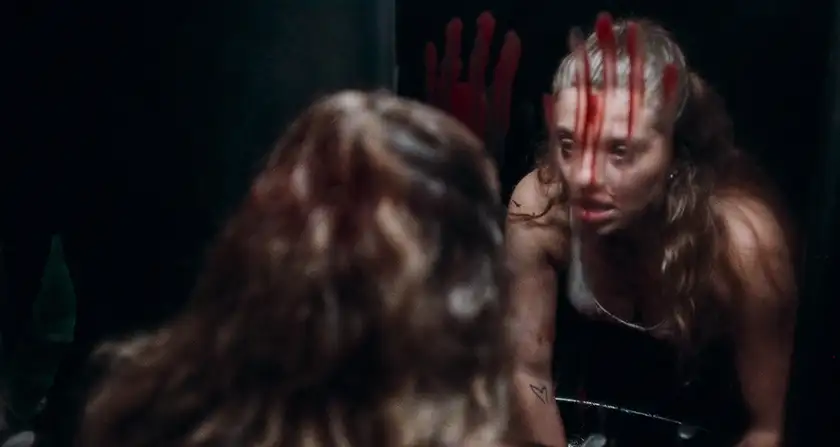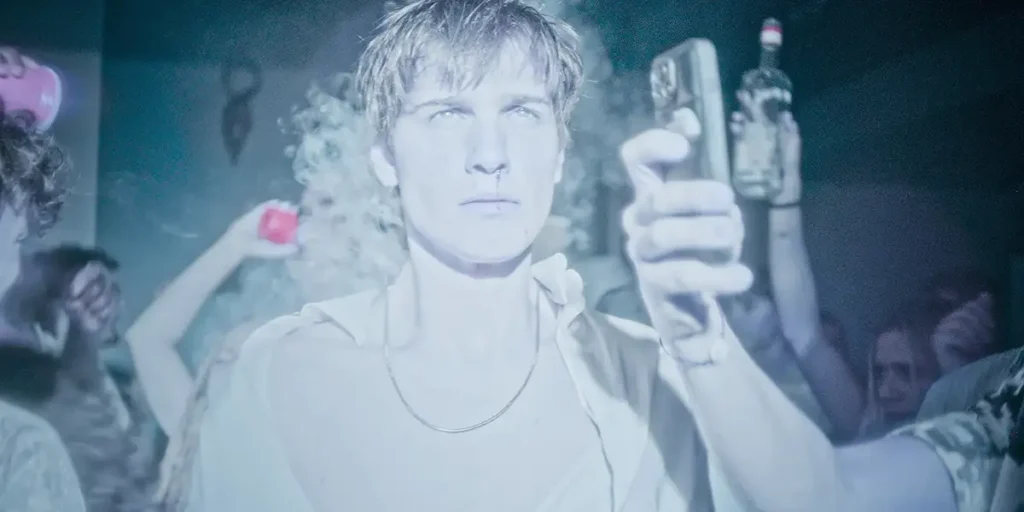David Moreau’s MadS pulls off a unique kind of apocalyptic horror experience—one that is scarce on gore but abundant in dizzying anxiety and paranoia.
Writer & Director: David Moreau
Genre: Horror, Thriller, Zombie
Run Time: 86′
Rated: TV-MA
Global Release Date: October 18, 2024
Where to Watch: on Shudder
The ambitious idea of carrying out a feature film in one continuous take has not been unheard of before, but it is nevertheless quite an impressive achievement that writer-director David Moreau displays with his new Shudder original, MadS. The film is constructed to take us on a tension-filled rollercoaster ride throughout the streets of an entire city in France while the camera barely has time to blink and so do we.
MadS starts us off with rowdy and reckless teenager Romain (Milton Riche) at his drug dealer’s place, where he gives a new test drug a shot and gets ready for a wild night of partying. On his way to the party, Romain’s journey gets completely derailed by a frantic injured woman, who appears by his car out of nowhere. Everything just descends into madness from there, almost in the literal sense of the word.
The one-shot gimmick is undeniably one of the boldest decisions you can make as a filmmaker, because telling your story through an unblinking lens becomes a far more challenging exercise in creativity. Usually, movies that go this less-trampled route tend to stay within a limited space or location simply because of the practical restrictions of filming in that way, but MadS doesn’t shy away from expanding on its world, taking you through all kinds of locations, even following different characters without a flinch.
The shift of perspectives is a clever curveball that Moreau throws in to counterbalance the technical disadvantages, which could have otherwise made MadS feel too modest or small in scope. The more we learn and the further we unravel the hellish circumstances of our characters, the more the decision of having multiple points of view makes sense, as the chaos that ensues rapidly begins to spread beyond just Romain and the stranger in his car.
There is something to be said about how the film handles that diversion in the narrative, because, although it feels like a justified creative choice given the premise, it’s not enough to prevent the movie from losing a bit of steam past the decisive midpoint. The first half is a panic-stricken catastrophe brimming with suspense and unpredictability. With every corner Romain turns, the stakes are raised a notch higher, and they continue climbing up until the crucial point of no return, when bloodshed disseminates.

MadS focuses on the horror of the unknown by firmly locking us only within the vicinity of the character we’re following at that particular moment. We’re not let in on any more than they are, but we can feel the cataclysm looming over streets we don’t even get to see. With the lack of gore and graphic violence, Moreau displays a great deal of faith in his audience that’s refreshing to experience. His technique leans more towards creating a certain doomsday atmosphere that we, along with the characters, cannot see all the time but know we cannot escape. More so than in other cases, the actors on screen are a most effective tool to achieve this sense of invisible terror.
The film owes a lot to its three leads, Milton Riche, Lucille Guillaume, and Laurie Pavy, who stay committed to embodying a sense of overwhelming dread. Their characters’ strange process of mental and physical deterioration is incredibly taxing to portray in a film, which doesn’t offer the privilege of an easy cut and redo. They manage to successfully sell the adrenaline and the overpowering flood of fear, motivating them to keep running from the carnage that threatens to catch up any minute.
There are moments of losing steam when the physical language of the actors is the only interesting thing on screen, which makes it lose its effect way quicker. It’s too evident when Moreau relies entirely on his actors to carry certain, let’s say, transitional segments of the movie, and the result comes out repetitive. MadS gets dangerously close to staggering its own momentum as hastily as it gains it, but, luckily, there’s enough there to push through the havoc without completely losing the audience to the bleakness.
MadS is a product of David Moreau and cinematographer Philip Lozano carefully assembling a 90-minute nightmarish sequence that is technically impressive and, reminiscent of Gaspar Noé’s Climax, takes the meaning of a bad trip to a whole new level.
MadS is now available to watch on Shudder.

